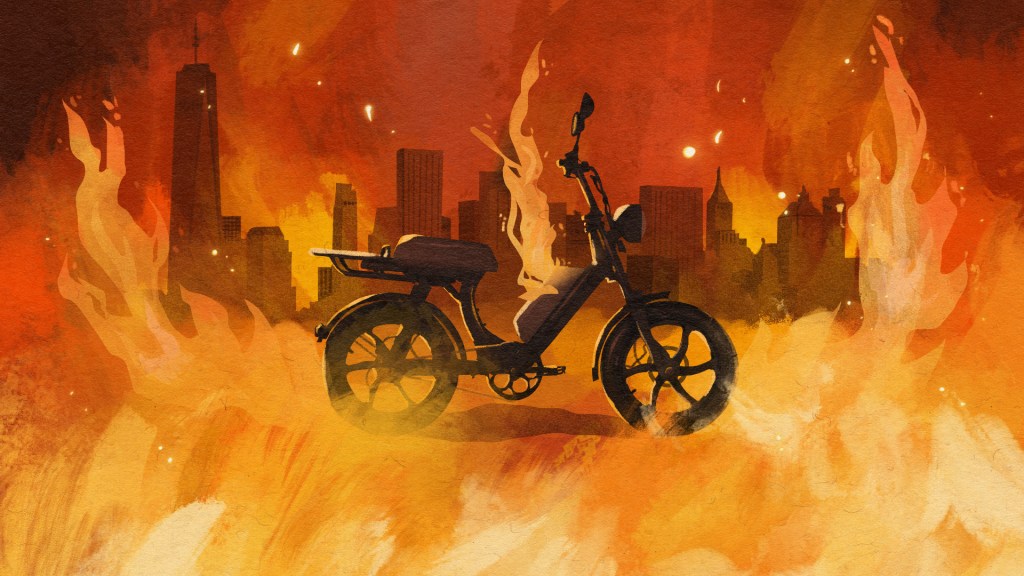The world was a very different place when I bought my first electric scooter in the Summer of 2019.
Before the pandemic, I would only occasionally glimpse a fellow scooter rider on the streets of Brooklyn. Unlike the app-based rental scooters that pollute the streets of San Francisco and other cities, I wanted an electric vehicle that would be all mine—something fast and reliable that I could use to commute to work, effectively reducing my transportation costs to zero.
Videos by VICE
Eventually I started taking it everywhere—grocery runs, bars, the club—and realized I needed to upgrade from my cute and compact $500 scooter to a beefier model with dual brakes, better suspension, and a faster top speed. Eventually, I stopped taking the subway entirely. I felt like I had transformed into a cyberpunk scooter fairy, speeding along New York City roadways and spreading the gospel of electric vehicle ownership everywhere I went.
Then COVID-19 happened, and everything closed down. As case numbers went up and subways became scarier, I saw more and more scooter riders hit the streets of New York. It was not long after that I had to do my first scooter repairs—first a flat tire, then a short in the electrical system, and then a lithium battery that had to be replaced entirely.
Perhaps unsurprisingly, not many people in Brooklyn specialize in repairing e-scooters and other personal electric vehicles. I found myself hauling my broken scooter out to local bike and motorcycle shops before eventually finding a place that could do full service repairs. When I arrived, I realized it was just two guys working out of a garage in the back of somebody’s house. Practically every inch of the garage was filled with scooters in various states of disrepair; the mechanic told me they recently had to stop taking in scooters because the recent surge in electric vehicles had overwhelmed their two-person team.
The situation has driven some scooter riders to become electric vehicle repair specialists themselves.
“I had a flat tire so I called up the place I got the scooter and they didn’t respond, so I went crazy and fixed it myself,” Gregory DiBenedetto, the founder and co-owner of Mini Motors Brooklyn, told Motherboard. “That’s what made me wanna open this place.”
DiBenedetto and his business partner Vincent Bitetti opened shop in February 2021, and they say they now repair an average of 15 scooters per day. The surge in new scooter riders has been driven by the pandemic, says Bitetti, and also by food delivery drivers, who have increasingly embraced small electric vehicles in lieu of cars. More recently, the surge in gas prices resulting from the ongoing war in Ukraine has caused another spike in scooter and e-bike ownership as more people seek to avoid paying hefty premiums at the pump.
“A lot of people are using these scooters to do Uber and stuff, so anybody that doesn’t have a car or a license can now buy an electric scooter and be able to go do deliveries and make money,” Bitetti told Motherboard.
The increasing demand over the past few years has made businesses like Mini Motors Brooklyn into a growing cottage industry for electric vehicle repair. Depending on the brand, e-scooter manufacturers themselves can have varying levels of customer service, and many companies will simply refer customers to local repair specialists—assuming any exist in the area.
“There’s definitely a shortage of talent,” said DiBenedetto, noting that some motorcycle and bike shops are starting to service e-scooters to keep up with the times. “The problem is with most of these scooters you buy on Amazon and stuff, there’s no customer service. If you had a warranty you’d have to box it back up again and send it back to them.”
Like DiBenedetto, my friend Faye Dimos entered the world of e-scooter repair out of necessity. A motorcycle mechanic who operates out of a small garage in North Brooklyn, Dimos started looking for alternate modes of transport earlier this year, and eventually landed on a basic e-scooter to take her on shorter trips. When I came to her garage asking if she could help me replace a tire and a smashed front fender, she saw it as an opportunity to future-proof her repair skills in anticipation of a coming wave of electric vehicles. (I paid $60 for the repair)
“Companies are just pumping these things out, and there’s no repair infrastructure,” Dimos told me. “There’s this whole section of our culture that’s mechanics and technicians, and they’re gonna be completely in the dark about a lot of this stuff.”
Part of the reason for this, she says, is the way electric vehicles are designed and built, which in many ways is more similar to a smartphone than a traditional gas engine vehicle. Parts are often difficult to source, and many scooters and e-bikes simply aren’t designed with repair in mind—mirroring the planned obsolescence that plagues many consumer electronics. And even with manufacturers that offer warranty service, many scooter owners in rural and suburban areas will find it difficult or impossible to find a repair specialist nearby.
“I think there’s gonna be growing pains for a lot of these technicians, because at a certain point they’re gonna be completely obsolete,” said Dimos. “In 20 or 30 years if all you know how to do is work on a gas-powered vehicle, you’re basically gonna be working on antiques, and you’re not gonna be able to maintain a business model.”
Still, Dimos is hopeful that eventually, the demand will outpace the inertia, and more mechanics will start learning to service scooters and other small electric vehicles.
“When gas is 10 or 20 dollars a gallon, everyone is gonna be up in arms about this shit and the infrastructure will spring up,” she said. “When that will happen though is a big question mark.”




